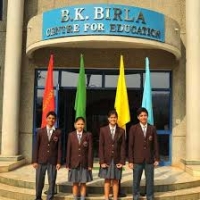B K Birla Centre For Education in Pune, Maharashtra Admission, Fees Structure

Where is B K Birla Centre For Education ?
B K Birla Centre For Education is Located in Pune , Maharashtra, India
Address of B K Birla Centre For Education, Pune
Near Talegaon Dabhade
Taluka Maval
District: Pune 410506
Maharashtra
India
+91-8380968333
+91-8888823596
principalbirlacentre@gmail.com
How do I contact B K Birla Centre For Education?
Call at +91-8380968333 to contact B K Birla Centre For Education
About B K Birla Centre For Education
BK Birla Centre for Education is a world-class residential school located near Pune, Maharashtra, that is affiliated to Central Board of Secondary Education (CBSE), New Delhi. To impart well rounded, comprehensive, world class education with the highest levels of safety and security. To produce young men who are happy, resilient, self-motivated, confident with eco-consciousness to grow up to be global citizens with humanitarian values.The BK Birla Centre for Education (BKBCE) is a world-class residential school located near Pune (just 126 km from Mumbai), Maharashtra. It is considered to be one of the best CBSE boarding school in Maharashtra. The classrooms and laboratories are fitted with specially designed, modern, ergonomic furniture that ensures that pupils do not suffer fatigue. The modern science and computer laboratories, the audio/visual room and the art activity centres are also housed in the academic block.The school has five hostel blocks that accommodate students, house masters, tutors, the ward boys/ the ayahs (matrons). Each hostel block is a two-storeyed structure divided into dormitories, residential flats, common rooms and a study room for students. Since its inception, the school has believed that education must assiduously promote and nourish as wide a range of capabilities and dexterity in children as possible. As a step towards this, the school offers a range of laboratories, latest teaching aids, sports infrastructure, and other residential facilities.
05 million while the population of the metropolitan region is estimated at 74 million Situated 560 metres (1,837 feet) above sea level on the Deccan plateau on the right bank of the Mutha river, Pune is also the administrative headquarters of its namesake district In the 18th century, the city was the seat of the Peshwas, the prime ministers of the Maratha Empire and was one of the most important political centres on the Indian subcontinentPune is widely regarded as the second major "IT hub of India" and the top "automobile and manufacturing hub of India".
It is known as the "Oxford of the East" with the presence of a wide range of educational institutions India's first indigenously-run girls' school was started in Pune by Savitribai Phule along with her associate Fatima Sheikh The city has emerged as a major educational hub in recent decades, with nearly half of the total international students in the country studying in Pune Research institutes of information technology, education, management and training attract students and professionals from India and overseas
The Godavari and the Krishna are the two major rivers in the state Marathi is the most widely spoken language and is also the official language of the state Spread over 307,713 km2 (118,809 sq mi), it is the third-largest state by area in India Maharashtra is bordered by the Arabian Sea to the west, the Indian states of Karnataka and Goa to the south, Telangana to the southeast and Chhattisgarh to the east, Gujarat and Madhya Pradesh to the north, and the Indian union territory of Dadra and Nagar Haveli and Daman and Diu to the northwest Nagpur hosts the winter session of the state legislature.
The state has three international airports, Chhatrapati Shivaji Maharaj International Airport (Mumbai), Dr Babasaheb Ambedkar International Airport (Nagpur), and Pune Airport (Lohegaon, Pune) The state is home to three railways headquarters viz Central Railway (Chhatrapati Shivaji Maharaj Terminus), Konkan Railway (CBD Belapur) and Western Railway (Churchgate) The High Court of the state viz.
Bombay High Court is located in Mumbai Prior to Indian independence, Maharashtra was chronologically ruled by the Satavahana dynasty, Rashtrakuta dynasty, Western Chalukyas, Deccan sultanates, Mughals and Marathas, and the British Ruins, monuments, tombs, forts, and places of worship left by these rulers are dotted around the state The state is home to two UNESCO World Heritage Sites: Ajanta and Ellora caves Pune is known as the 'Oxford of the East' due to the presence of several well-known educational institutions.
Nashik is known as the 'Wine Capital of India' as it has the largest number of wineries and vineyards in the country Maharashtra is the most industrialised state in India and the state's capital, Mumbai is India's financial and commercial hub The state has played a significant role in the country's social and political life and widely considered a leader in terms of agricultural and industrial production, trade and transport, and education Maharashtra is one of the most developed and prosperous Indian states and continues to be the single largest contributor to the national economy with a share of 15% in the country's GDP The economy of Maharashtra is the largest in India, with a gross state domestic product (GSDP) of ₹28.
78 trillion (US$400 billion) and has the country's 13th-highest GSDP per capita of ₹207,727 (US$2,900) Maharashtra is the fifteenth-highest ranking among Indian states in human development index